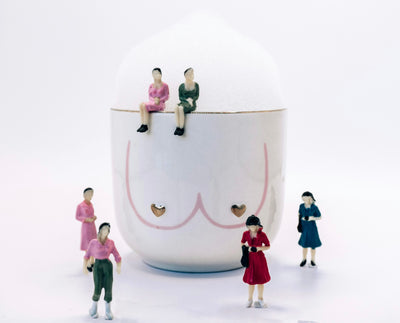Let's Talk About Postpartum Weight and Exercise
Let's Talk About Postpartum Weight and Exercise
By Katie Black

In our image obsessed world where celebrities flaunt flat stomachs and boast of getting back to their pre-baby weight just weeks after giving birth it comes as no surprise that a lot of women have complicated feelings about their own weight postpartum. Add to that how hard it is to exercise regularly (because y’know, you’ve got a newborn to take care of) and women can quickly become discouraged and negative about their bodies.
Health risks of postpartum weight

There are some genuine concerns healthcare professionals have when it comes to gaining weight during pregnancy. For example, if women gain weight during pregnancy following the Institute of Medicine’s recommendations, but don’t lose the extra weight by 6 months postpartum, they often experience long term weight increases.
Additionally, your body mass index (BMI) pre-pregnancy has been shown to play a big part in long term obesity, because women who start pregnancy heavier keep on more weight after childbirth. 15 years later - these women were at risk for excessive weight gain and at high risk for coronary heart disease (CHD), plus other chronic obesity-related diseases. However, women who did aerobic activities during the postpartum period were less likely to be obese 15 years later than those who did not. Breastfeeding does have some effect on weight loss, but it’s small.
In order for healthcare workers to best support women to reach exercise and weight goals, researchers first need to figure out what women are prioritizing because a one-size-fits-all approach is rarely effective.
The study
A study from the American Journal of Maternal/Child Nursing set out to find views about exercise and weight from a group of moms. The researchers said the purpose of this was to
“describe the views of a small group of ethnically diverse new mothers on the attitudes and preferences of women like themselves related to weight, exercise, and walking as a form of exercise in the first year following childbirth in order to help nurses better understand how to care for this population.”
They interviewed moms during the first year of postpartum about their thoughts on weight, choice of exercise, walking for exercise, perceived benefits, barriers, and factors that could make the process easier.
Results
Of the sample, 64% of the participants thought weight is an important issue for women. Broken down further, 58% of Black women saw it as important, 69% for Hispanic women, and 75% for White women. Weight isn’t just a health issue, rather they found it’s also tied to identity and affects how moms see themselves.
The moms’ views of exercise also differ. For example, White women tend to see exercise as a way to “control weight, improve overall mood, and maintain fitness” while Hispanic women tend to see exercise as a means to “reduce stress and improve general health”.
While almost all the participants saw exercise as a positive thing and something to help with fatigue, the main barrier was children or lack of childcare. This worsened if the mom had two kids or more. The second biggest barrier – not having enough time.
Specifically for walking as exercise, the barriers added up. Health problems like asthma, illness, or disability plus unwalkable or unsafe neighborhoods played a role as well.
The good news
What was promising about the study is that there are definitely ways to increase physical activity postpartum. Firstly, the participants said that scheduling a walk would help them tackle a walking plan (the preferred form of exercise among the moms). The second most helpful idea is having a walking buddy like a partner or a friend who also recently gave birth.
The most common places to walk are parks (50%), an outdoor track (20%), or neighborhood (16%).

All of this information could definitely aid healthcare workers when making diverse and unique postpartum plans for moms.
If you’re a new mom struggling with postpartum exercise or weight gain, you’re not alone. Being a new mom can already be isolating, but the problem has seemed to grow due to Covid (yet another fallout). Thankfully, there are lots of mom Facebook groups, including ours! Join the Lactation Lounge here. Try finding one in your area and see if anyone is interested in becoming a walking buddy-you’d be surprised how many people are in the same shoes.






